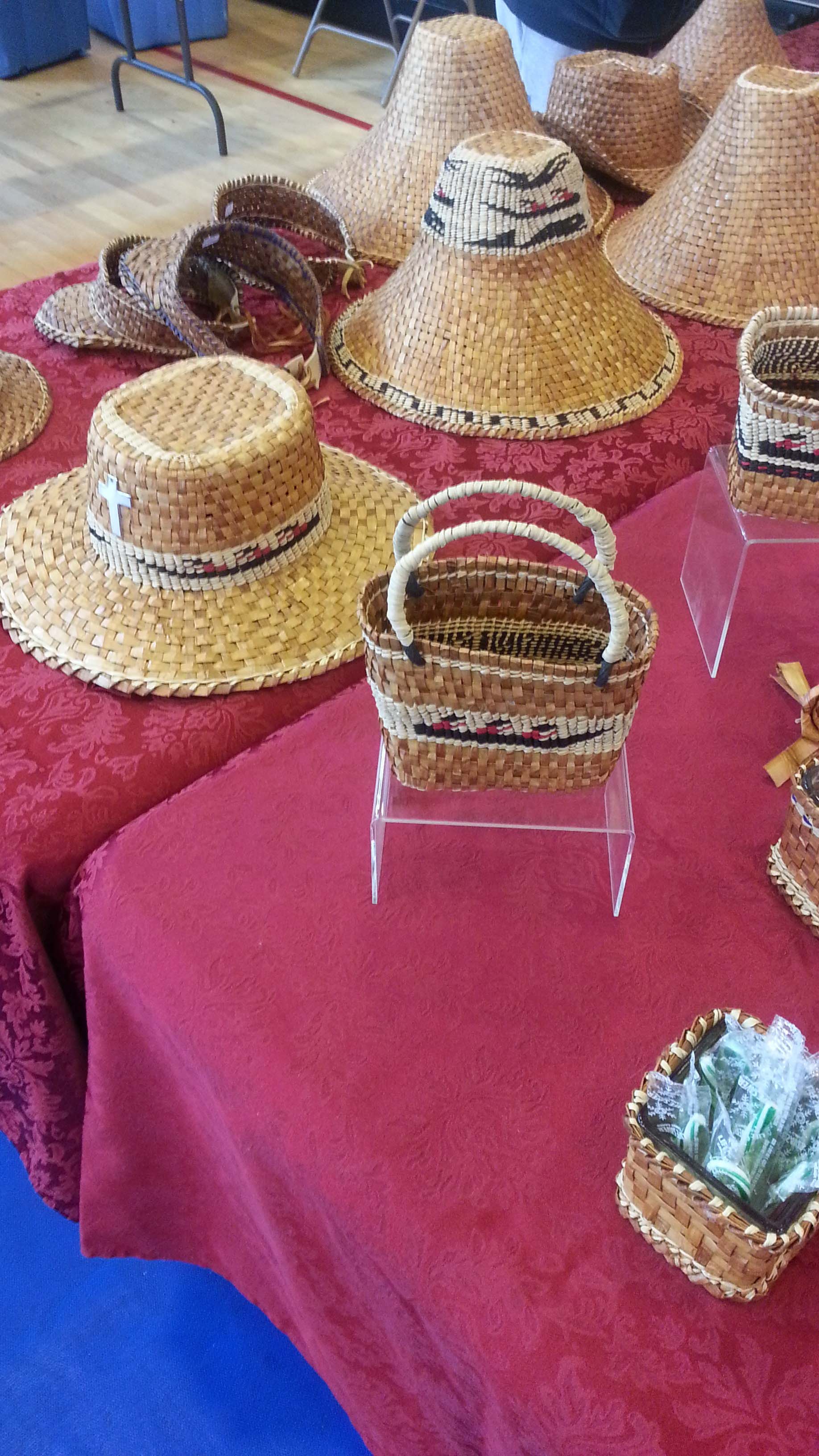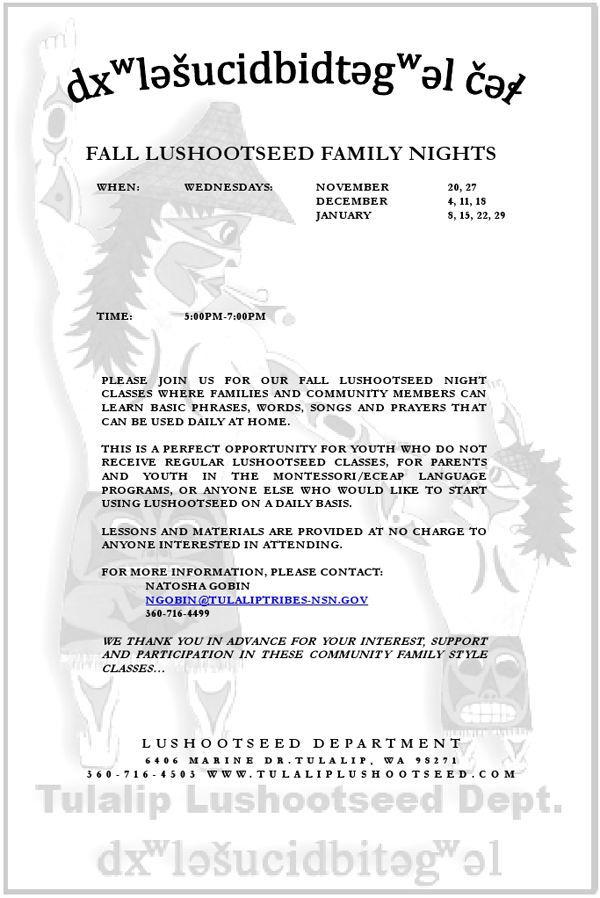Tag: Tulalip
Marysville students out perform the nation’s priority schools

Andrew Gobin/Tulalip News
NEA recognizes Marysville schools’ turnaround
Article and photos by Andrew Gobin/Tulalip News
Tulalip − American Education Week began Monday, November 18th, with visits to Totem Middle School and Tulalip Quil Ceda Elementary school by the National Education Association (NEA) and Washington Education Association (WEA). Both campuses, earmarked as priority schools, exemplify a joint commitment of students and teachers to academic achievement. The incredible turn around embodies the intent of the School Improvement Grant (SIG grant) they received as schools in need. A change in national perspective led to the development of the grant which catalyzed the positive turn around at these schools.
“Because of previous legislation, schools that needed assistance were labeled failing,” said Kim Mead of the WEA, referring to No Child Left Behind, which decreased funding to schools that did not meet state and national standards. “We changed our perspective, failing schools came to be seen as priority schools.”
In the last five years, 97 Washington schools were considered failing and had their funding cut. With the new perspective of those schools as a priority, the US Department of Education created the SIG grant in 2010, providing three-year funding to schools on the national priority list. 28 schools were awarded grant funding of the 60 eligible schools in Washington state that applied.
The SIG grant is conditional funding, giving four plan options to bring schools up to standard. These options are closure and transfer students to high achieving schools, turnaround by reorganizing currents school curriculum and staff, transformation through a change in leadership and instruction, and restart which would convert public schools to charter schools, which were illegal in Washington state until 2012. Of the 28 Washington priority schools awarded grants, now specified as SIG schools, 1 school closed, 23 selected transformation, and 4 opted for the turnaround, including Totem, and Tulalip Quil Ceda.
Led by the teachers, these schools developed their staff and curriculum to change the professional practices in their schools. Through the SIG funding, Totem purchased laptops for each grade in order to assess individual understanding of course materials. They developed a home visit program so that teachers have the necessary skills to bring school needs into the home, while addressing home issues, not as a means lower standards or make accommodations, but to understand how to balance the school work with home life. The most prominent demonstration of home life coming to school is the morning assembly at Tulalip Quil Ceda, which incorporates traditional values into the school day. The NEA observed the assembly during their visit.
“I chose Washington to kick off American Education Week,” said Dennis Van Rockel, NEA president. “I hear so much about Washington, what you all are doing here, and I’m glad to be able to come and see it first hand.”
Programs in these SIG schools that see drastic positive improvement are leeching out into other schools throughout MarysvilleSchool District.
“This is important as we get ready to roll out the Common Core curriculum, which is the national standard equivalent,” said Tulalip Quil Ceda teacher, George Camper.
2013 marks the final year of the SIG grant funding, which means the priority schools were evaluated nationwide. Totem and Tulalip Quil Ceda not only outperformed all others in the state, they outperformed the nation’s priority schools. In recognition of their achievement, each of their libraries were given $500, and each school was given a banner acknowledging their accomplishment.
The nation is now looking to Washington as an example for the work Totem, and Tulalip Quil Ceda schools have done. They have set a standard for priority schools nationwide, which is described in a packet titled ‘Improving Student Achievement in High-Poverty Schools: Lessons from Washington State,’ that outlines how these schools successfully turned around from persistently low achieving to high achieving.
Team N Tense Speeding in to the 2014 Competition Season
The start of a new season for Team N Tense, Coached by Kim Fleischmann skating for Marysville Skate Inn began in Puyallup, WA the weekend of November 15-17. Where the inline speed skaters ages 6-69 years of age raced their season opener. The skaters were ready to begin the season with practices starting in September training 3+ days a week. Team N Tense received placements in the following divisions.
Primary Boys Ben Juracich 1st Place, Elementary Boys Ivan Spencer 6th Place, Freshman Girls Nikita Fleischmann 5th Place, Freshman Boys Nashone White Bear 1st Place, Sophomore Women Rachel Killstrom 6th Place, Sophomore Men Torin Davenport 2nd Place, Senior Men Jerimiah Lotan 3rd Place, Veteran Men Eric Fleischmann 3rd Place, Esquire Men Fred Brevic 1st Place. Elementary2 Boy Relay Ivan Spencer-Isaac Juracich 4th Place, Sophomore 2 Man Relay Nashone White Bear- Torin Davenport 4th place, Veteran 2 man relay Eric Fleischmann- Fred Brevic 2nd Place.
Also competing in the meet was Juvenile Boy Isaac Juracich, Elementary Girls Abby Varn. Great job Team N Tense. The next competition will be held in Auburn, WA Jan 18-20.
Fryberg honored for service on School Board
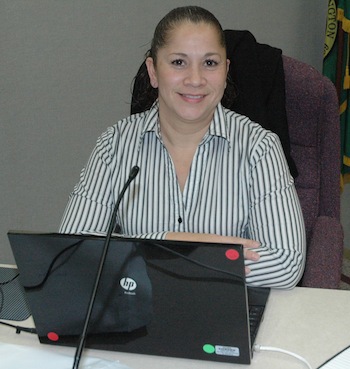
— image credit: Kirk Boxleitner
KIRK BOXLEITNER, Marysville Globe Reporter
MARYSVILLE — Wendy Fryberg began serving on the Marysville School District Board of Directors in 2010, after being appointed to the Director District 4 position in the wake of Michael Kundu’s resignation, and she retained that seat in 2011, after running unopposed, but when that term expired this year, she chose not to run for re-election.
As such, the Marysville School Board was joined by members of the Marysville School District, as well as the surrounding Marysville and Tulalip communities, in honoring Fryberg’s service to the school district during the Board’s regular session meeting on Monday, Nov. 18.
Marysville School Board President Chris Nation called a recess during the meeting to conduct a brief celebration in tribute to Fryberg, during which he and his fellow Board members were effusive in expressing their praise and appreciation to Fryberg, whose departure also leaves vacant the Board’s vice president position.
“Wendy brought instrumental leadership to this board,” said Nation, who also serves in the Director District 1 position. “I will always embrace that.”
“Wendy has been a heart behind the Board — a gentle, willing person with an iron heart to serve our children,” said Dr. Becky Berg, superintendent of the Marysville School District. “She will be missed.”
“I have always been impressed with how Wendy and the other Board members care about the children — all children,” said Pete Lundberg, who serves in the Director District 3 position. “Wendy is very thoughtful and a good decision-maker.”
Tom Albright, the Board’s Legislative Representative who serves in the Director District 5 position, credited Fryberg with helping the Marysville School District Board of Directors receive the title of Board of the Year from the Washington State School Directors Association in 2012.
“It has been an honor and a pleasure to work and sit beside Wendy for three years,” Albright said. “I appreciate her smile and her hard work on behalf of all students.”
The meeting’s attendees from the public included Mel Sheldon Jr., chair of the Tulalip Tribes, as well as Sheryl Fryberg and Norma Razote — the general manager and deputy manager of the Tribes, respectively — and each one had plaudits and insights of their own to share about Wendy Fryberg’s service on the Marysville School Board.
“Thank you, Wendy, for stepping up to the plate, addressing the challenges and serving on the School Board for every child,” Sheldon said. “You have made us all proud, along with our community. Your work will serve our next generation. We raise our hands up to you.”
“I am so proud of Wendy and her sheer determination,” Sheryl Fryberg said. “She has grown tremendously through her work on the School Board. From the budget to academics, she took it all to heart. We are very proud of her, and happy to have her come back to our family gatherings. I also lift my hands to Wendy, and to all of the School Board members, for the important work that they do.”
“Wendy has been a great support for me this past year,” Razote said. “She has evolved so much, and as the executive director in adult services for the Tulalip Tribes, I have counted on her so much. I’ve heard so many great things about her work on the School Board.”
Following some coffee and cake, Wendy Fryberg thanked everyone for their comments.
“This has been a great three years,” Fryberg said. “I have learned a lot. I want to thank Don Hatch Jr. for strongly encouraging me to follow in his footsteps and serve on the School Board. This is a really profound team that we have. It’s been a strong team. I appreciate what I’ve learned about the educational system as a Board director, and I’m thankful that my children and everyone’s children are well taken care of in the Marysville School District. I really appreciate this recognition.”
Shop for Native American holiday gifts at Tulalip
By Monica Brown, Tulalip News writer.
TULALIP, Wa- Tulalip’s annual Native Bazaar is happening this weekend, Nov 23rd and 24th, and December 7th and 8th. The bazaar is a great place to buy handmade gifts for friends and family and offers everything from cedar woven items art, carvings and drums, to jewelry, clothing and food.
The bazaar is open 9:00am – 4:00pm and is located at the Don Hatch Jr Youth Center, 6700 Totem Beach Rd, Tulalip. I-5 exit 199, follow the signs.


Learning to live with, and heal from, generational trauma

Andrew Gobin/Tulalip News
By Andrew Gobin, Tulalip News
TULALIP − “It’s about language and perspective. How issues are talked about. How issues are presented and received,” said Ryan Akin, one of the new additions to the child and family therapy team at beda?chelh. As he transitions into his position in the Tulalip community, Akin discusses his views on mental wellness and what it takes to get there.
“I’d like to explain a little bit about what I do,” he began. “I am a counselor, not a therapist. Therapy in practice works to identify a problem and help people fix that problem. Counseling moves away from the very sanitized and sterile practice of therapy, focusing on people. Everyone here is an individual. We respond to the person, not the issue.”
Grief counseling is one aspect of his job, and in an effort to understand the people he is working with, he was encouraged to attend a funeral service for a tribal member to experience the grief of the family and the community. He offered grief counseling to kids for a week following the funeral.
“This is so different than the institutionalized idea of people. Rather than learning about them and their needs, I live with them and experience who they are in order to understand their needs,” Akin explained.
The Tulalip community is unique, as are most tribes. They have a history of generational trauma intertwined with tradition and cultural revitalization.
“Understanding generational trauma is integral in helping people to wellness. You have to know that each piece that shapes behavior potentially stems from these traumas. It’s the difference between ‘and’ and ‘but’. I’m trying to be ok but I have this trauma, versus, I have this trauma and I will be ok.”
Ultimately, Akin’s goal is to help remove the generational trauma Tulalip people, and all Indian people, have been steeped in. Healing the community now will prevent the coming generations from experiencing these same traumas.
“We focus on the small steps towards healing, not the five to ten years it takes to get there. This is not a doctor’s office. There is no checklist or agenda. It is based on the person.
“For Indian people, the road to wellness is more like a filter. Holding on to what was, bringing that forward to what is now, and looking to what will come next, while continuing to bring the past forward,” he concluded.
Akin acknowledges the team of counselors he has joined. It is their joint work to promote mental wellness and work towards building a strong connection with the community in order to create a comfortable and safe environment for everyone.
“I want people to understand what we do here. I want anyone to be able to come and talk about things that we can help them with,” he said.
For more information contact Ryan Akin at rakin@tulaliptribes-nsn.gov, or by phone at (360) 716-3284.
Andrew Gobin: 360-716-4188; agobin@tulaliptribes-nsn.gov
Officials from the Marysville School District hold break out sessions working to improve community schools
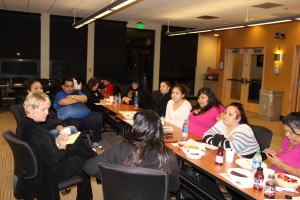
Andrew Gobin/Tulalip News
by Andrew Gobin, Tulalip News
TULALIP − Coming to the MarysvilleSchool District, Dr. Becky Berg aimed to “hit the ground running,” according to the Marysville Globe. True to her word, Berg wastes no time when it comes to improving community schools. On November 14th, she and other district officials held a community meeting at the TulalipAdministrationBuilding, the first in a series of meetings, in order to identify concerns and provide information about this year’s levy.
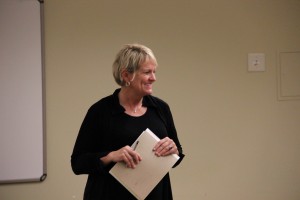
Andrew Gobin/Tulalip News
“We want to hear from you all,” Berg said. “What are the concerns you have about your schools? What are some positive things or what would you like to see continued?”
Two breakout sessions, facilitated by Berg and assistant superintendent Ray Houser, were a forum where the community spoke on a personal level with district officials, discussing their past experiences attending Marysville schools or having children attend Marysville schools, what works in the district, changes that they’ve seen, improvements that need to be made, and programs they’d like to see developed. One major issue raised by parents and teachers at the meeting was the drastic educational gap in the classroom.
“We have high school math classes with students meeting and exceeding their level, mixed with students that are stuck at a 5th grade level,” said heritage principal Shelly Lacey.
Other topics discussed were programs that have been cut, including evening transportation after extra curricular activities like sports, band, clubs, etc., and problems with the schools’ environment such as bullying, apathetic staff, and teachers uninterested in whether or not students learned.
“We don’t feel welcome. Our kids feel unwelcome at school, and we as parents feel that we can’t approach the teachers,” said Misty Napeahi. She has children in school now, as well as graduates of the MarysvilleSchool District.
Many of these issues were addressed in the levy presentation that followed the discussions, which highlighted specific areas that need improvement. Line items included in the levy are programs for high achieving students, students needing to be brought up to grade level, transportation, teachers and aides, support staff (nurses, counselors, etc.), staff training and development, extra curricular activities, and upgrading district technology, each addressing various academic needs. Each of these items discussed, as well as dollar allocations, emphasized the levy as the means to helping every student to succeed. The support staff and staff development portions are crucial to changing the environment of Marysville schools, which is a constant concern at Tulalip.
Upgrading technology and accessibility may be the most crucial for academic success at the current time.
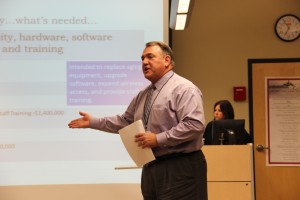
Andrew Gobin/Tulalip News
“We spent all the time, money, and effort to put in the fiber-optic network we have now, yet it remains inaccessible because of a lack of hardware,” said Jim Baker, the district’s executive director of finance. “With the proper tools and training, we hope to improve student performance in the classroom, as well as the effectiveness of the teachers.”
District officials stressed the need for the levy to pass in order to provide better resources in the classroom.
“As it stands, there is more advanced technology and capable users at McDonald’s than there is in our schools,” noted Berg.
This levy truly is all encompassing, addressing academic, structural, and environmental needs. If passed, the levy stands to increase funding for these programs by $85 million over the next four years. The issues discussed at this and other community meetings will be deciding factors in how the money is spent, specifically with regards to staff development. The next community meeting and levy presentation is slated for December 4th of this year, 6:00 pm at the district office. More information is available on the district website, or you may call the district office at (360) 653-7058.
Andrew Gobin: 360-716-4188; agobin@tulaliptribes-nsn.gov
What 10 percent can do for you

No Excuses: Fiscal responsibility and financial planning
By Andrew Gobin, Tulalip News
Tulalip − With the holidays coming into full swing and people struggle to make ends meet, family budget and financial planning are too often a second thought.
“In general, American families lack budgeting and financial planning,” said Dave McLean, the housing finance and budget advisor at Tulalip.
“The best thing families can do is sit down and specify their needs and wants. Bills and groceries are needs, for example. Make a financial plan and budget to cover your living costs, then the rest of your money can go towards purchasing things you want, or into savings. As a general rule you should save about 10 percent of each check,” explained McLean.
A financial plan that includes allocating money to savings sets you up for success later on in life.
“Start at 10 percent,” said McLean. “Ideally it should be more than that, but it’s specific to each budget. When you want to buy a house, the down payment is typically 5 percent of the total cost of the house. Your savings should be enough to cover that. Continue saving money and grow your nest egg. The money you put away should see you through your retirement, in addition to any retirement plan or pension you may have.
“Credit is another aspect of fiscal responsibility. Financial planning will assist you in paying off large dividends, like a car payment, and monthly bills, all of which build your credit. How much money you save plays into that as well.
“Credit cards are great at establishing credit early on, but should be used carefully. Be sure to eliminate your incurred debt as soon as possible. The best plan is to pay off your credit card each month, both building your credit score while sticking to your budget.”
Not everyone has the necessary skills to budget effectively. McLean mentions that there are numerous budgeting classes offered at community colleges, churches, and even suggests budgeting manuals that can be found at the library.
Mclean said, “Nobody has an excuse not to pay more attention to budgeting. It is an important skill that will help everyone later in life.”
Fall Lushootseed Family Nights
NW books | Growing up on Tulalip Reservation; ‘Pig War’
Books of Seattle-area interest: “Tulalip, From My Heart,” “The Pig War” in paperback, “Larry Gets Lost in Prehistoric Times” and “Why Do I Sing.”
Source: Seattle Times
“Tulalip, From My Heart” by Harriette Shelton Dover (University of Washington Press, $50). In this hardcover book, Dover describes her life growing up on the Tulalip Reservation. She highlights the troubles the Tulalip Tribes encountered as they resettled, moving from their villages to the bayside reservation. Once there, the tribes faced hunger, poverty and persecution. Dover, born on the reservation in 1904, was the first Indian woman to serve on the Tulalip Board of Directors.
“The Pig War” by Mike Vouri (Discover Your Northwest, $18.95). New in paperback: Vouri tells the story of a sequence of events in the San Juans during 1859, when a shot pig almost led to war between Great Britain and the U.S. This new edition includes additional photos, maps and illustrations. Vouri is the chief of interpretation and a historian for the San Juan Island National Historic Park. He lives on San Juan Island.
“Larry Gets Lost in Prehistoric Times: From Dinosaurs to the Stone Age” by Andrew Fox and John Skewes, illustrated by Skewes (Sasquatch, $16.99). For ages 4-9: Larry, a dog who famously got lost in Seattle, now time-travels to learn about dinosaurs, woolly mammoths and Homo sapiens in this picture book. Both authors live in Seattle.
“Why Do I Sing: Animal Songs of the Pacific Northwest” by Jennifer Blomgren, illustrated by Andrea Gabriel (Sasquatch, $16.99). For ages 4-8: With rhyming verse and beautiful paintings, the book celebrates the Northwest’s noisy natural inhabitants, from the “long, low voices” of fin whales to the bugles of a Roosevelt bull elk. Blomgren lives in Port Townsend and Gabriel lives in Bellingham.





